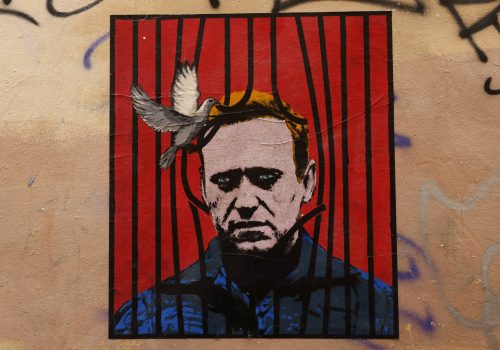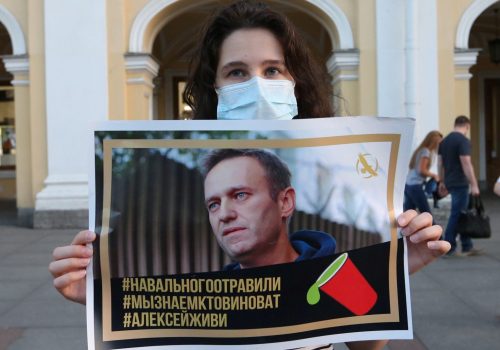FAST THINKING: What to do about Navalny
JUST IN
The Biden administration came into office pledging to strengthen democracy at home and abroad. And it’s quickly confronted two big challenges on that front: a coup in Myanmar and the arrest of the Kremlin’s top critic, Alexei Navalny. On Tuesday a Moscow court sentenced Navalny to more than two and a half years in prison, just months after he was poisoned by a nerve agent at the suspected direction of the Kremlin. How should the US and its allies respond?
TODAY’S EXPERT REACTION COURTESY OF
- Anders Åslund (@anders_aslund): Senior fellow at the Eurasia Center
- Dan Fried (@AmbDanFried): Distinguished fellow and former US assistant secretary of state for European and Eurasian affairs
How we got here
- After recovering in Germany from Novichok poisoning, Navalny chose to return to Russia and stand up to the very person who he claims had just tried to kill him—Vladimir Putin—even though “it was clear that Putin would have him arrested,” Anders tells us. Navalny then further raised the stakes by releasing a film, which has now attracted well over 100 million views, exposing “Putin’s palace” and the government corruption he alleged bankrolled the lavish property. “Navalny effectively cornered Putin,” Anders says.
- And Navalny did so again “by instigating big protests in more than 100 Russian cities” on two recent Sundays, Anders adds, prompting Putin to “arrest thousands on each occasion.” In Russia, he notes, “the mood has changed. The protesters are no longer joking and the police repression has turned much more aggressive. There is a sense of terminal battle.”
What the US and its allies can do next
- “This is a defining moment” for the new Biden administration, Anders says. While National Security Advisor Jake Sullivan and Secretary of State Tony Blinken have condemned Russia’s repression, Anders advises them to quickly impose sanctions on Russian figures who appear on a list issued by Vladimir Ashurkov, Navalny’s representative in London, of members of Putin’s unofficial inner circle who are prime targets for Western sanctions.
- That list includes a Kremlin propagandist; two top oligarchs; a couple “princelings”; the head of a bank Putin is thought to use as a “slush fund”; and Russia’s health minister, who Navalny holds among those responsible for his poisoning.
- “By acting fast, in coordination with Europe and the UK, the Biden administration would show that we are serious about pushing back on Putin’s outrages,” Dan notes. “Going after corrupt Putin cronies would be an apt response to the imprisonment of a dissident who has exposed Putin’s massive corruption.”
- It would also “puncture Putin’s shell of impunity,” he adds, and “send a message to the ruling elite that there are consequences for being part of the Kremlin kleptocracy. And it would send a message to Russians now demonstrating for justice that they are not alone—that the US, for all its faults, stands with them and with others like them.”
But will it work?
- “In the short term, autocrats have the muscle and the advantage,” Dan tells us. But success isn’t always measured in such increments. “Ronald Reagan called the Soviet Union an ‘evil empire,’” which “many in the US dismissed as mere cant. But Polish dissidents sitting in prison heard of Reagan’s statement and felt immediate hope. As one told me later, what he thought at the time was: ‘The Americans get it; the free world gets it. We are not alone.’ He told me this when he was a minister in a democratic Polish government after 1989.”
Further reading
Thu, Jan 28, 2021
Navalny vs Putin: what next?
UkraineAlert By Peter Dickinson
January 23 saw some of the biggest anti-regime protests across Russia in recent years. What can we expect from the escalating confrontation between Vladimir Putin and opposition leader Alexei Navalny?
Mon, Jan 25, 2021
Navalny’s arrest is Biden’s first big test. Here’s how he can pass it.
New Atlanticist By Daniel Fried, Anders Åslund
What happens next matters. The US response (or lack of response) will show how much Russian President Vladimir Putin’s internal repression—including assassinations—will factor into the Biden team’s overall Russia policy. The trick for the Biden administration will be to respond with sufficient firmness and cross-Atlantic coordination to puncture Putin’s apparent sense of impunity while leaving space for cooperation with Russia where that makes sense.
Fri, Aug 21, 2020
Navalny joins long list of poisoned Putin critics
UkraineAlert By
Expert Opinion: What does the suspected poisoning of Russian opposition leader and anti-corruption activist Alexey Navalny tell us about the current political climate in Putin’s Russia?
Image: Russian opposition leader Alexei Navalny, who is accused of flouting the terms of a suspended sentence for embezzlement, inside a defendant dock during the announcement of a court verdict in Moscow, Russia February 2, 2021. Press service of Simonovsky District Court/Handout via REUTERS


